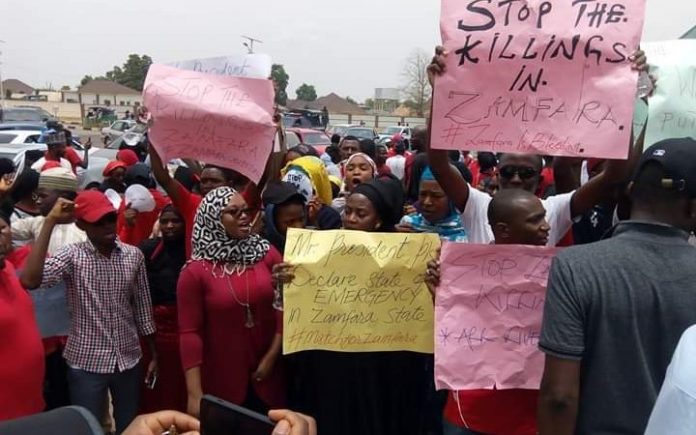
A coalition of Northern Nigerian Youth Associations under the umbrella of Arewa Youths Federation (AYF) held a protest in Zamfara State yesterday, urging government to checkmate the activities of bandits in the state.
The demonstration followed the reported killing of about 50 persons in three local government areas of the state at the weekend.
“This breach is now extending from killings to targeted abductions that are intended to be high-profile. These crimes are also beginning to spill into neighbouring states,” AYF President Adamu Matazu told News Agency of Nigeria (NAN).
He regretted that despite “well-intended steps so far taken by the Federal Government and implemented in part by the nation’s security and military services, the situation remained unabated.”
According to him, this has confirmed longstanding fears that political elites and traditional rulers in parts of the country are behind the wave of violence.
“The crux of the matter is that these elites are operating illegal gold mines, knowing full well that the practice violates local and federal laws. They are also aware that their activity, which thankfully has been stopped by the Federal Government, is detrimental to the state economically, environmentally, security-wise and socially.
“The AYF hereby calls for an end to killings in Zamfara and the whole of northwest Nigeria. Our call is imperative because we stand by the people of Zamfara. We assure that we are not powerless as a people to demand respect for human life in this part of Nigeria and across the country,” he said.
His appeal came as Emir of Katsina, Katsina State, Alhaji Abdulmumini Kabir Usman warned that the region could face a food crisis, unless kidnapping and banditry were contained.
The monarch spoke when Minster of Agriculture and Rural Development Audu Ogbeh and Central Bank of Nigeria Governor Godwin Emefiele visited him at his palace yesterday. Both men were in the state to launch the distribution of cottonseeds to farmers.
“Those living in the rural areas are the worst affected as they are frequently killed, maimed and set ablaze at will and no one is protecting them. No one in the rural area is farming at the moment. They have fled and their farms have been burnt. We have a looming case of food scarcity in our state currently,” he said.
“Please, take my message to the president. Tell him to help us and save us from banditry and criminality. No one is safe in the state again. Let him ensure the prompt release of the Magajin Daura,” the emir appealed.
Armed men abducted the Magajin Daura, an acquaintance of the president, last week.
Worried about the growing risk to life and property across the country, the Petroleum and Natural Gas Senior Staff Association of Nigeria (PENGASSAN) issued a statement in Lagos yesterday calling for “an immediate declaration of a state of emergency and overhaul of the nation’s security apparatus.”
It said: “The growing rate of insecurity in the land has become a nightmare. Daily, stories of killings in states, especially Borno, Zamfara, Kaduna, Sokoto, Yobe and Adamawa saturate the mass media.
“The Boko Haram sect and violent herdsmen have been notorious for blood shedding and destruction of the property of innocent victims. We condemn in totality these atrocities and find the situation highly unacceptable.”
The spokesman of the association, Mr. Fortune Obi, told newsmen that the situation suggested leadership failure. “That is why we call for a systematic mopup of arms and ammunition illegally acquired by politicians in the buildup to the general elections, especially now that the electoral process is over.”
Criticising agencies in charge of the nation’s borders for not living up to their responsibilities “because of self-aggrandisement,” he urged the Federal Government to apply equal force used in curtailing the activities of Movement for the Actualisation of the Sovereign State of Biafra (MASSOB), Oodua Peoples Congress (OPC), Movement for the Emancipation of the Niger Delta (MEND) and Indigenous People of Biafra (IPOB) in dealing with the current security challenge.
Rivers State Governor Nyesom Wike also sought a revamp of the country’s security, decrying a situation where operatives abandon their duties and pursue critics of security lapses.
The governor stated this when the joint House of Representatives Committee on Army, Police, Human Rights and Justice investigating the violence that marked the 2019 elections in Rivers State visited him at Government House, Port Harcourt.
“This is the only state the Federal Government has never assisted to fight insecurity. Instead of us to team up and fight insecurity, you politicise it. Even if you make recommendations, nothing will happen. I don’t know whether we are in a military regime or civil administration,” he lamented.
The Nigerian Army however has insisted that its ongoing operation Harbin Kunama III would curb insecurity in the northwest of the country.
Chief of Army Staff (COAS) Lt.-Gen. Tukur Buratai gave the assurance at the opening of the second quarter Logistics Planning Seminar at the 81 Division Officers Mess in Lagos yesterday.
Buratai, who was represented by Chief of Logistics Maj. Gen. Enobong Udoh, maintained: “The military is involved in internal security functions in all the states in the country, employing relevant tactics and strategies necessary to surmount the threats. The army will continue to play her roles in guaranteeing national security.”
Meanwhile, the Economic Community of West African States (ECOWAS) and the European Union (EU) are seeking to address maritime insecurity in the sub-region and have committed €155 million to the effort.
Mr. Kurt Cornelis, Head of Cooperation, EU Delegation to Nigeria and ECOWAS, disclosed this at the opening of a two-day maritime security meeting in Abuja, yesterday.
ECOWAS loses an average of $2 billion yearly to the theft of maritime resources and illegal fishing. In 2018 alone, 201 incidents of maritime piracy and armed robbery cases were reported. Also, in the same year, the gulf accounted for all six hijackings, 13 of the 18 ships fired upon, 130 of the 141 hostages held, and 78 of the 82 seafarers kidnapped for ransom worldwide.
